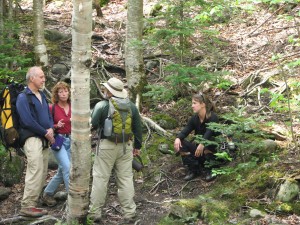Family Forests Research
Program Overview
Dr. Jessica Leahy, Program Leader
The mission of the Family Forest Program is to conduct applied scientific research and outreach that contributes to the sustainable management of Maine’s family forests for desired products, services, and conditions in partnership with Maine’s family forest stakeholders. Maine’s family forests (individuals and families holding parcels between 1 and 1,000 acres) have a significant impact on fiber supply, ecosystem services, recreation, and other benefits. Family forests account for approximately 34 percent of theforest area in Maine, and about 25 percent of timber harvested each year. Major issues facing family forests are related to development pressure, estate transfer, recreation access, and forest management.
Current Studies
Anticipating Emerald Ash Borer and Asian Longhorned Beetle in the Northern Forest: Opportunities for Community Leader and Landowner Cross-boundary Cooperation in Managing Forest Pests
Jessica E. Leahy, Janet Gorman, John Daigle, Sandra de Urioste-Stone, Crista Straub, Stephanie Snyder
As nonnative invasive insects such as the emerald ash borer (Agrilus planipennis) and Asian longhorned beetle (Anoplophora glabripennis) permeate the Northern Forest and move closer to Maine, an exigent need arises to create cross-boundary management plans involving a variety

of stakeholders. In order to create and implement effective early detection and long-term management against these forest pests, specific stakeholders such as community leaders and landowners must be recognized and understood. This study will focus on analyzing community trust and attitudes towards cross-boundary cooperation. In addition, trust and risk perception among an existing landowner dataset will be examined in order to better anticipate public reaction upon the arrival of one or both forest pests in Maine. The goals of this study are to:
- To determine commonalities between landowners who are willing to engage in forest pest management behaviors versus those who are unwilling in order to better anticipate reactions to new or continued forest pest management.
- To link community leader trust and attitudes about cross-boundary cooperation to management behavioral intentions.
- To apply relevant social theories to stakeholder attitudes in order to anticipate public reaction to various levels of forest pest management.
Understanding and Informing Family Forest Owner Decisions of Intergenerational Land Transfer to Ensure Working Forested Landscapes
Jessica Leahy and Kathleen Bell
Family-owned tree farms, known simply as “family forest lands” provide tremendous amounts of wood products and ecosystem services in the U.S, particularly in the northeast where 52% of the land is held by family forest owners (FFOs). Due to an aging landowner population, in the coming years, almost half of the FFOs in the U.S. will be deciding the future of their land (i.e., convert to another use, parcelize, conserve). These decisions will be the most important determinants of the viability of working forests, because forest cover loss and parcel size reductions eliminate or lessen forest management opportunities. Stabilizing the forest land base by stemming the tide of conversion and parcelization is critical to ensuring a future of viable and competitive working forested landscapes. The project team, made up of the Universities of Massachusetts, Maine, Vermont and Cornell aim to help stabilize the forested land base by working to ensure that a significant proportion of FFO lands are passed from one generation of landowners to the next with minimal amount of forest conversion and parcelization. The research component of this project will use landowner interviews and a mail survey to better understand how FFOs make decisions about the future of their land. These research findings will inform regional extension programs that use peer network and train-the-trainers approaches to help inform FFO decisions. By working to stabilize the land base in this way, this project will assist in maintaining a viable forest industry, and, ultimately, vibrant rural communities. The objectives of this study are:
- Gain a better understanding of the timing and influences of bequest decisions in the northeast region.
- Use research findings to develop effective conservation-based estate planning extension resources and programs.
- Amplify the reach of extension efforts through the development and training of a network of professionals and peer landowners.
- Inform the land bequest decisions of family owned tree farms and help them move forward in the conservation-based estate planning process by providing them with links to more experienced peers and knowledgeable professionals.
